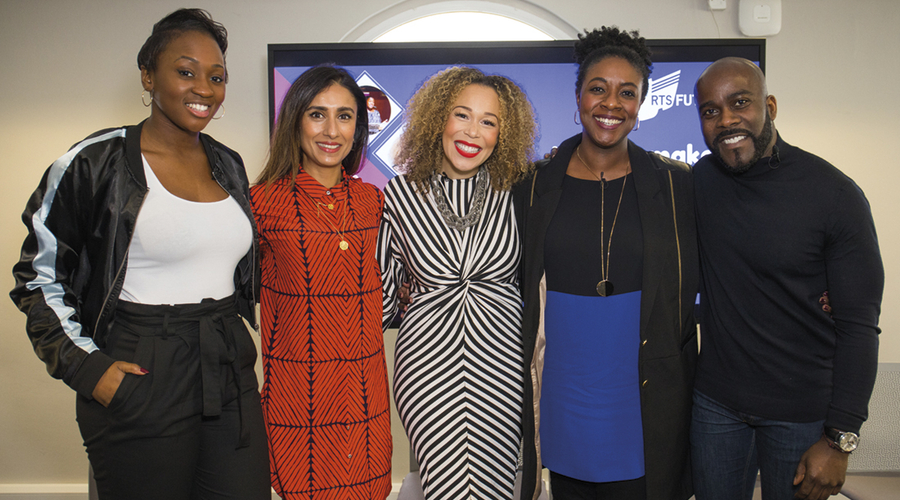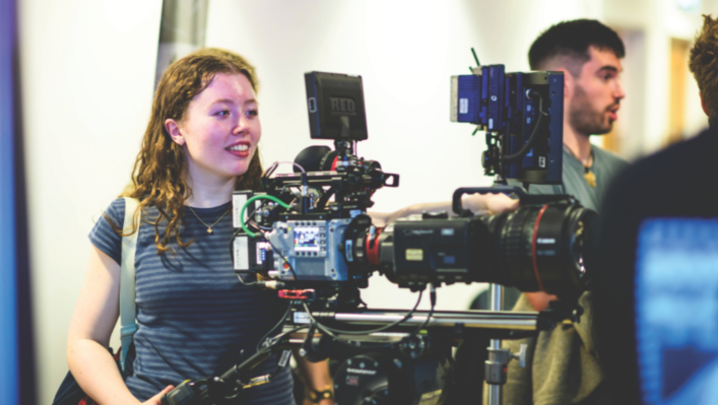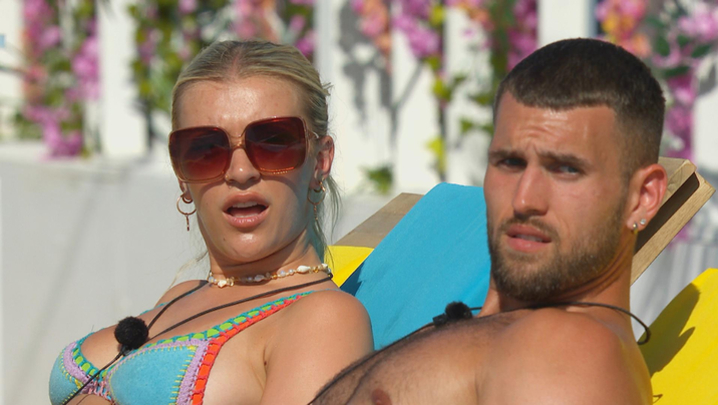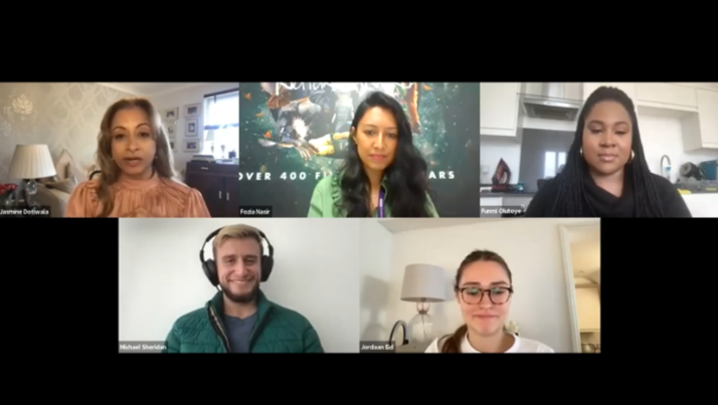Attendees at the RTS’s biggest TV Careers Fair yet received copious expert advice, reports Matthew Bell
More than 1,000 people attended the TV Careers Fair at the Business Design Centre, London, in early February, making it RTS Futures’ most successful event to date.
The all-day fair offered five sessions on getting started in television, while, in the exhibition hall, some 40 broadcasters, independent producers and industry bodies were on hand to pass on their TV knowledge to the eager students and media hopefuls.
In the first session, “Get ready for your TV job”, Jude Winstanley, who runs jobs website Theunitlist.com, advised her audience to forget the grand job titles of producer or director that they had enjoyed when making student films at university.
“In the real professional world, you are not one of those,” she said, emphasising that TV novices start at the bottom, as runners or loggers.
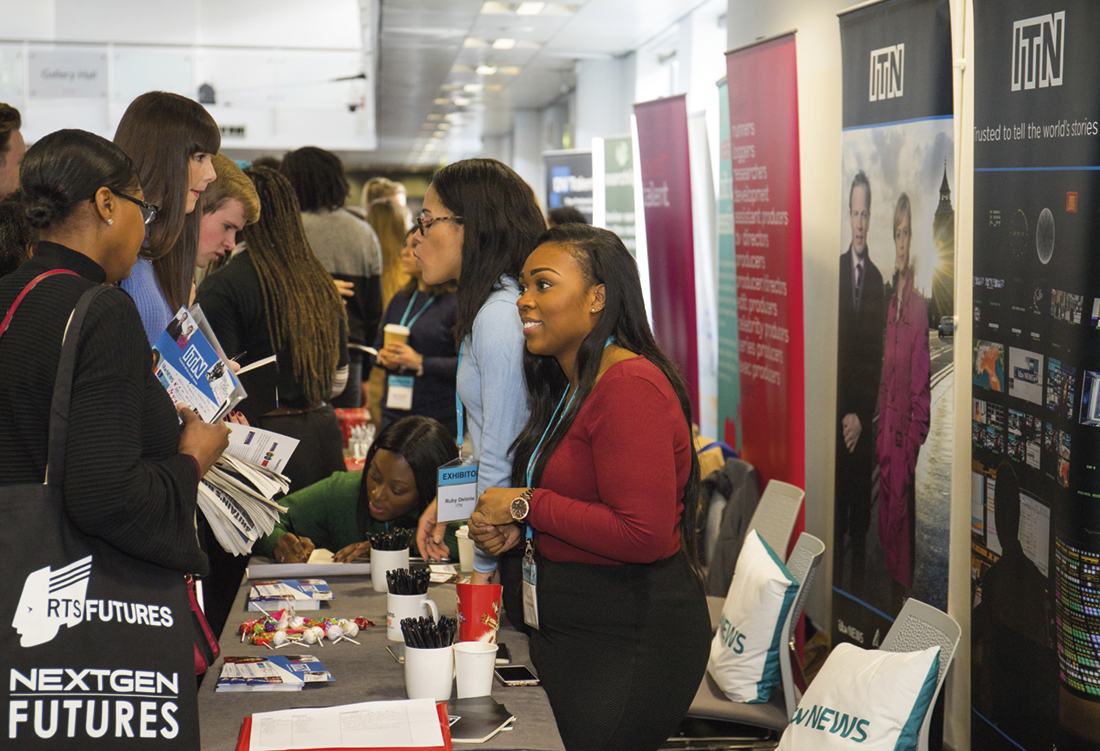
(Credit: RTS/Paul Hampartsoumian)
RTS Futures Committee member added that “film and TV are very different things”, even though their “roles may appear similar”. Moving between the two industries is not easy.
Employers hire on the basis of a person’s track record, so it is vital that entrants build a reputation in the TV industry as reliable and enthusiastic workers. “It’s less about who you know, more about who knows you,” said Winstanley.
Work experience is important, she explained, but it should never be exploitative: “There are loads of wannabe producers who will think nothing of using you to further their careers.” She said that internships should be paid and that volunteering should be reserved for charities. And, if you offer your services to a short film, “make sure you are learning something of value”.
Sky One entertainment and arts commissioner Bill Hobbins, who chaired the session on the entertainment genre, revealed that one of his earliest jobs in TV, 25 years earlier, was as a runner on BBC One game show Happy Families – working for one of the panellists, David G Croft.
“To get ahead, you need a number of breaks – pieces of luck,” said Croft. His good fortune came on a new BBC Two arts and music show, Riverside. He was making films for the show when, midway through the series, the multicamera director left and Croft stepped in to take control.
He went on to direct some of TV’s top entertainment shows, including Shooting Stars and The Crystal Maze, and is now the National Film and Television School’s head of television, where he runs the MA course in producing and directing TV entertainment.
One of Croft’s recent graduates, Lucy Smith, is working as an assistant producer in programme and format development at Firecracker Films. She quoted, approvingly, Hughie Green – host of British TV’s original talent show, Opportunity Knocks – on the public’s thirst for entertainment on the box: “People do not want three hours of fucking King Lear in verse when they get out of a 10-hour day in the fucking coal pits.”
She added: “In TV entertainment, I’m working with so many smart, creative, intelligent people.”
Children’s writer Hannah George revealed that, as a would-be dramatist, she had been “writing and writing, sending scripts to people who would not read them”.
She continued: “It’s a long and arduous process to get anywhere because no one wants to really read anything unless it comes from an agent. You’ve got to keep doing it.” Eventually, she got her break on CBBC fantasy drama Wolfblood, she said in “From script to screen”, which was chaired by Edinburgh International Television Festival Talent Schemes producer Holly Close.
But you don’t have to be a writer to work in drama, the audience learnt. Nawfal Faizullah, a script editor at leading indie Left Bank Pictures, described his job as being a “problem solver”, helping writers to “fix flaws or execute their vision for a show”.
Charlie Coombes began as a runner, before landing a job as a PA in BBC Comedy, where she started to dabble in development. Now, at CPL Productions, she works on developing “everything from pure studio sitcoms to big drama”.
In “How to make it as a presenter”, which was chaired by fellow presenter Ria Hebden, some of the UK’s leading TV and radio hosts discussed how they broke into the industry. Countryfile presenter Anita Rani, whose first media gig was on Leeds Student Radio, said: “There’s no real route or set trajectory.”
She added: “Bring your own skills and the best of luck to you.” Practice, though, makes perfect. “Presenting is a craft that you develop over time –you can get better at it,” said Rani.
Melvin Odoom, who hosts the radio show Kiss Breakfast and ITV shows such as Bang on the Money, added: “Work experience, for me, was imperative to understand how the industry works.”
Capital Xtra presenter Remel London told the audience that she “grew up with radio 24/7”, and tuned her TV to daytime talk shows hosted by the likes of Ricki Lake and Oprah Winfrey. Broadcast journalism at Leeds University was followed by stints at online youth entertainment channel Link Up TV and work as a production assistant before she secured her current Capital gig. She described this process as “climbing a ladder” but “a ladder that is not quick”.
In the day’s final session, Josh Portwine from equipment supplier Shooting Partners cast his expert eye over the leading cameras on the market and offered advice on how to find work as a camera operator.
What the experts say
The National Film and Television School’s David G Croft outlined a four-point plan for breaking into TV:
- Look at yourself in the mirror and ask, ‘Do I really want a career in television?’
- Try to work out what it is you want to do
- Research the industry and understand how it works
- Start making contacts with people from whom you could learn things and who may be able to help you in your career
Sky’s Bill Hobbins advised: ‘If you know the shows that you love to watch and that’s the world you’d like to work in, then get your CV ready and find out which indies make those programmes and get in touch.… Don’t be too pushy; be nice, keen and passionate.
‘If you want to be a director, go out and make something… have something to show. If you just go [to meet someone] and say, “I want to work in telly because it looks fun”, you will never float to the top.’
Children’s writer Hannah George advised: ‘Do not be scared to send people your scripts – I know so many writers who never send anything out. It’s very exposing sending someone your script, but you have to get over it.
‘Rejection is the biggest part of being a writer, but you’ve just got to learn to live with it. People are going to be rejecting you more than they accept you.… If someone says they are not interested in your script, it doesn’t necessarily mean it’s bad, it’s just not for them.’
TV presenter Anita Rani warned: ‘You need to be tenacious – it takes a long time and you’ve got to be prepared to work long hours doing things you don’t necessarily want to do.’
The RTS Futures TV Careers Fair was supported by the Edinburgh International Television Festival, the National Film and Television School and Sky One.

